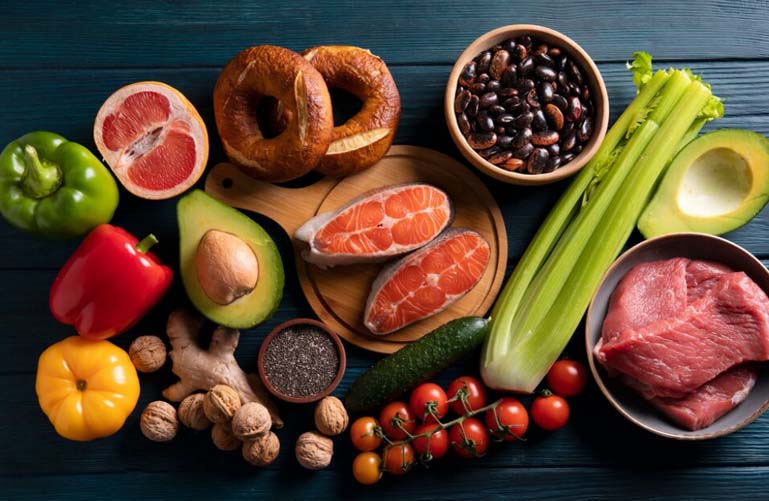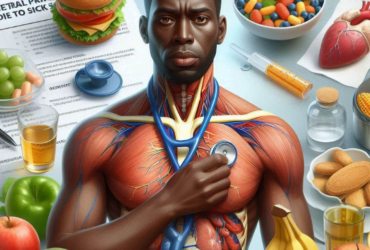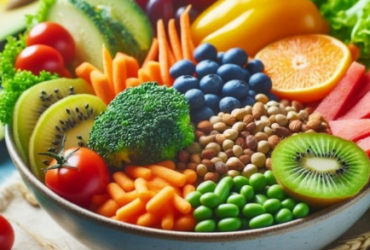In addition to their structural importance, proteins also play a crucial role in a wide variety of biological functions. For example, they act as enzymes, catalyzing chemical reactions in our body. They are also responsible for the transport of molecules and nutrients through the blood, as well as cell-to-cell communication and signal transmission.
Proteins are found in a wide variety of foods, both animal and plant origin. Foods such as meat, fish, eggs and dairy products are rich in animal proteins. On the other hand, legumes, nuts, seeds and cereals are also good sources of plant proteins.
The amount of protein we need varies depending on our age, sex, level of physical activity and state of health. However, in general, it is recommended that protein make up between 10% and 35% of our total daily calories. For example, a person who consumes 2,000 calories per day should consume between 50 and 175 grams of protein per day.
It is important to keep in mind that not all proteins are created equal. Amino acids are the building blocks of proteins, and there are different types of amino acids. Some amino acids are essential, meaning our body cannot produce them and we must obtain them through diet. Other amino acids are non-essential, since our body can synthesize them from other compounds.
In summary, proteins are essential for our body, playing a vital role in the growth, development and maintenance of our tissues and organs. Additionally, they have key biological functions, such as catalysis of chemical reactions and transport of molecules. We must ensure that we consume enough protein in our daily diet and obtain a variety of protein sources to obtain all the essential amino acids necessary for our body.

5. Defense and protection
Another important function of proteins is their role in the immune system, where they act as antibodies to defend our body against pathogens and other foreign substances. Antibodies bind to antigens, marking them for destruction by other cells of the immune system.
In addition to their role in the immune system, proteins can also act as protective agents. For example, some proteins in the skin act as physical barriers to prevent harmful substances from entering the body.
6. Muscle contraction
Proteins are also essential for muscle contraction. Two main proteins involved in this process are actin and myosin. These proteins interact with each other to generate the force necessary for muscle movement.
Actin and myosin are found in muscle fibers and their interaction allows muscles to contract and relax. This function is crucial for body movement, from simple activities like walking to more intense activities like running or lifting weights.
7. Regulation of metabolism
Proteins also play an important role in regulating metabolism. Some proteins act as enzymes that participate in chemical reactions that break down nutrients and convert them into energy usable by the body.
In addition to their function as enzymes, proteins can also act as regulators of metabolism. For example, insulin is a protein that regulates blood glucose levels, allowing cells to use glucose as an energy source.
8. Neural communication
Proteins are also essential for neuronal communication. In the nervous system, proteins act as neurotransmitters, transmitting electrical and chemical signals between nerve cells. These signals are essential for the transmission of information and the proper functioning of the nervous system.
In addition to their role as neurotransmitters, proteins can also act as receptors on nerve cells, allowing these cells to respond to chemical signals coming from other cells or the environment.
In summary, proteins perform a wide variety of functions in our bodies, from providing structure and support to acting as enzymes, regulators, and chemical messengers. Its importance is crucial for the proper functioning of our body at all levels, from the cellular to the entire system.

Protein sources
There are different sources of proteins that we can include in our daily diet. Here are some options:
1. Animal sources
Animal sources of protein include meat, poultry, fish, eggs and dairy products. These sources are usually rich in complete proteins, that is, they contain all the essential amino acids that our body needs.
Meat is an excellent source of protein, especially lean meats like chicken and turkey. These meats are low in saturated fat and high in high-quality protein. Fish is also a great option as it contains omega-3 fatty acids, which are beneficial for heart health.
Eggs are another very versatile source of protein. They are rich in essential amino acids and also contain important vitamins and minerals. Dairy products, such as milk, yogurt, and cheese, are also excellent sources of protein. Additionally, they contain calcium and vitamin D, which are important for bone health.

2. Vegetable sources
Plant sources of protein include legumes, such as beans, lentils, and chickpeas, as well as soy-based products, such as tofu and tempeh. These sources may not be complete proteins, but they can be combined to obtain all the essential amino acids.
Legumes are an excellent option for vegetarians and vegans, as they are rich in protein and also contain fiber, vitamins and minerals. Tofu and tempeh are soy-based products that are very popular among vegetarians and vegans. These products are rich in protein and also contain iron and calcium.
3. Other foods
In addition to animal and plant sources, protein can also be found in other foods, such as nuts and seeds. These foods also provide healthy fats and other beneficial nutrients.
Nuts, such as almonds, walnuts, and hazelnuts, are rich in protein and healthy fats. They are also an excellent source of fiber and vitamin E. Seeds, such as chia seeds, flax seeds, and sunflower seeds, are also rich in protein and healthy fats. In addition, they contain fiber, vitamins and minerals.
In summary, there are many sources of protein that we can include in our daily diet. Both animal and plant sources offer healthy and nutritious options. Plus, nuts and seeds are great supplements for extra protein and healthy fats. When choosing our protein sources, it is important to consider our individual dietary needs and opt for options that are right for us.
5. Transport and storage of nutrients
In addition to their role in building and repairing tissues, proteins are also responsible for the transport and storage of nutrients in our body. For example, some proteins act as carriers of oxygen in the blood, while others help store essential nutrients such as iron.
6. Hormonal regulation
Proteins also play a crucial role in hormonal regulation in our body. Hormones are chemical messengers that help control various bodily functions, such as growth, metabolism, and reproduction. Many hormones are made of proteins, and without them, our body would not be able to function properly.
7. Formation of enzymes and neurotransmitters
Enzymes are proteins that help speed up chemical reactions in our body. They are necessary for the digestion of food, the synthesis of nutrients and the detoxification of harmful substances. Additionally, neurotransmitters, which are the chemicals responsible for communication between nerve cells, are also made of proteins.
8. Muscle repair and growth
Protein is especially important for those who engage in regular physical activity. During exercise, muscles are worn down and damaged, and protein is necessary for their repair and growth. Without adequate protein intake, the muscle recovery process can be compromised and make training progress difficult.
In short, proteins play a fundamental role in our diet and in the proper functioning of our body. Not only are they essential for building and repairing tissues, but they are also important for satiety and appetite control, metabolism and calorie burning, immune function, nutrient transport and storage, hormonal regulation, formation of enzymes and neurotransmitters, and muscle repair and growth. Therefore, it is important to ensure that we include quality protein sources in our daily diet.
Protein intake recommendations
Protein intake recommendations may vary depending on age, gender, physical activity level, and other factors. However, in general, it is suggested that adults consume about 0.8 grams of protein per kilogram of body weight per day.
It is important to note that these are only general recommendations and may vary depending on individual needs. Some people, such as athletes or those who are trying to build muscle mass, may require a higher protein intake.
In addition to the quantity of proteins, it is also important to consider their quality. Proteins are made up of amino acids, which are the building blocks of our body. Some foods contain high-quality proteins, which provide all the essential amino acids our body needs.
Some high-quality protein sources include lean meats, poultry, fish, eggs, low-fat dairy products, legumes, and nuts. These foods are not only rich in protein but also contain other essential nutrients such as vitamins and minerals.
On the other hand, there are also lower quality protein sources, which do not provide all the essential amino acids in adequate quantities. These sources include foods such as grains, legumes and nuts. However, it is possible to combine different sources of plant proteins to obtain all the necessary essential amino acids.
In summary, to ensure adequate protein intake it is important to consider both its quantity and quality. It is always advisable to consult with a health professional or nutritionist to determine individual protein needs and design a balanced diet appropriate for each person.
Conclusion
Proteins are essential nutrients for our body and play a crucial role in the growth, development and maintenance of our tissues and organs. They are necessary for good health and can be found in a variety of sources, both animal and plant. Ensuring we get enough protein in our diet is important for maintaining good health and promoting the proper functioning of our body.
Importantly, proteins are not only important for the growth and development of tissues, but they also play a fundamental role in the production of enzymes, hormones and antibodies. These substances are necessary to carry out different functions of the body, such as digestion of food, regulation of metabolism and protection against infections and diseases.
In addition, proteins are also a source of energy for our body. Although carbohydrates are the main source of energy, when there are not enough carbohydrates available, the body can turn to protein as an alternative fuel source. However, it is important to keep in mind that using protein as an energy source is not efficient and can have negative effects on the body in the long term.
Regarding protein sources, it is important to have a balanced diet that includes both animal and plant proteins. Animal proteins, such as meat, fish and dairy, are complete sources of protein, as they contain all the essential amino acids that our body needs. On the other hand, plant proteins, such as beans, legumes, and nuts, are also important sources of protein, but they may be deficient in some essential amino acids. Therefore, it is important to combine different plant protein sources to ensure you get all the necessary amino acids.
In short, proteins are essential nutrients that play a crucial role in our body. They are necessary for the growth, development and maintenance of our tissues and organs, as well as for the production of enzymes, hormones and antibodies. Ensuring we get enough protein in our diet is essential to maintaining good health and promoting the proper functioning of our body. It is important to have a balanced diet that includes both animal and plant proteins to obtain all the essential amino acids that our body needs.
Maybe you might like: Fried Chiken
Image credit: freepik









